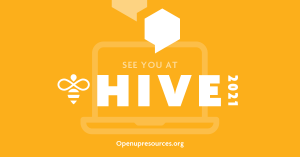I just completed a self-paced course (for me, a VERY dangerous notion – self-paced, that is) that focused on utilizing the PRESS (Path to Reading Excellence in School Sites) Reading Intervention. Our district has used PRESS as an intervention in our elementary buildings for several years now. I wasn’t familiar with PRESS until I stepped into the position of Literacy Instructional Coach three years ago. Since then, I have been able to use some of the interventions with students, and assist teachers with implementation.
As I moved through the course, (which I had access to in May, but didn’t start until last week :(, I was amazed at all that I was learning about the intricacies of PRESS. Before starting the course, I had assumed that it would serve as a refresher and I would feel a little better about how to best implement PRESS. This is the problem with assumptions – they are based on beliefs rather than facts. I don’t know that assumptions can be avoided, but they need to be monitored. If I had let my assumption take over, I may have missed the very deep learning that came from the course.
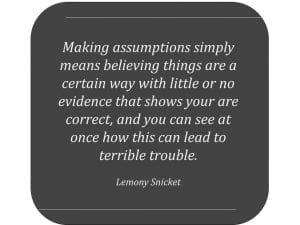
Without getting into the fine details of my learning specific to PRESS (which is a terrific research and evidence-based reading intervention), I have some key takeaways about learning, in general, that will continue to support my efforts to remain “forever a learner”:
- Monitor assumptions
- Remain open to learning
- Take time to process your learning
Monitor Assumptions
Again, I don’t think assumptions can be avoided, but I know that I want to stay tuned into the assumptions that I make. By definition, an assumption is: “a thing that is accepted as true or as certain to happen, without proof.” I believe the more we can engage in thinking, speaking, and listening based on proof/evidence, the better off we are, which is the reason I recently added the Power of Positive Resources and Science of Reading Resources pages to this site. If I were to cater to my assumptions, I would miss out on some powerful learning opportunities and fall prey to misjudging other people.
Remain Open to Learning
Well this certainly isn’t a novel notion. Educators are forever talking about finding the joy in lifelong learning. Some version of “lifelong learning” likely shows up in many school mission and/or vision statements. It shows up as one of our “Belief” statements in the Fort Madison Community School District: “Learning is a lifelong process.” I can’t help but think of my mom, who at age 75 is still tending bar at the Corner Tap, a business that she and my dad have owned for nearly 40 years. Running a business in 2021 looks different than it did in 1982, as much in the record-keeping portion of the business as in other aspects. The record-keeping portion of the business has, predictably, become digitized. Mom holds her own in this arena, admittedly with support from those who are a bit more tech-savvy. She and I recently renewed her alcohol and liquor license; although the heavier lift fell my way, she was right there throughout the whole process. She is also the Queen of sending texts, sprinkled with the best emojis to her kids and grandkids. My dad, on the other hand, can’t figure out why people “keep putting stuff all over my Facebook!” I can’t wait to see what their great-grandchildren, the first of whom was born just this morning, have to teach them!
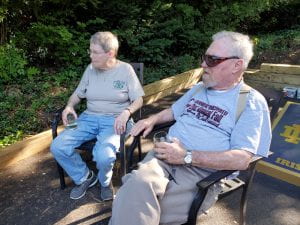
My parents, Sue and Reed Haeger, June 2021

Corner Tap, West Point, IA
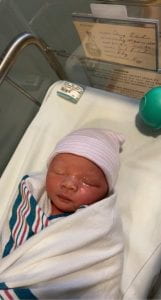
Quincy Reed Richardson, born @ 8:38 a.m., July 18, 2021
The notion of being a life-long learner is certainly something I’ve tried to embrace for myself, as well as instill in my own three boys young men. It might just be taking hold. My oldest son, Elton, at age 20, has launched his own business, Kruse Concrete Construction. Over the weekend, he completed this project for a customer. If he can do this at age 20, and embraces lifelong learning, the kid young man will fly!
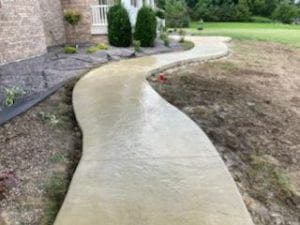
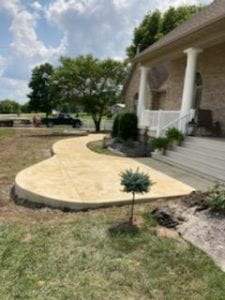

Process Learning
In order to “seal the deal” on any new learning, it’s critical to take time to process that learning. When I encounter a new concept, I find that if I talk about it, write about it, and certainly practice it (whatever “it” may be), my level of understanding becomes much deeper. This blog has unequivocally served that purpose for me. Writing about my learning has taken my level of understanding to much greater depths than I had anticipated (assumed???)! There are also times as I am working on a draft for the blog that I pause and talk about the topic with whichever poor unsuspecting family member has walked through the room. In addition, I feel a bit more confident in conversations with colleagues when discussing topics that I have written about… Science of Reading, anyone?
We know how important it is for our students to talk and write about their learning. The EL Education Curriculum embraces this idea in their read-think-talk-write cycle. 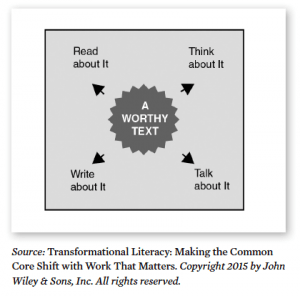
EL Education’s Your Curriculum Companion, summarizes the cycle this way: “The read-think-talk-write cycle gives students an opportunity to synthesize evidence, play with ideas, develop arguments, and ‘rehearse’ various forms of communication during lessons (or sequences of lessons).” EL recognizes the importance of student discourse, and places great emphasis on it. Again, from Your Curriculum Companion, “We subscribe to the idea that ‘learning floats on a sea of talk’ (Barnes, 1976).” Finally, EL incorporates writing into every part of the curriculum. From Your Curriculum Companion “…writing is a way for them to crystalize their thinking,” and “Writing is also a way for students to communicate their learning…”
As I look forward to the Open Up Resources HIVE conference this week, I can’t wait to further my learning around supporting teachers (25 from our district are attending the conference!) in their implementation of the EL Education Curriculum. With folks like Brooke Powers, Morgan Stipe, Sarah Said, Justin Endicott, Ciera Searcy, and Better Lesson‘s Jennifer Cripe and Kim Penn leading the way, it’s sure to be a learning palooza, supporting my mission to remain “forever a learner!”
